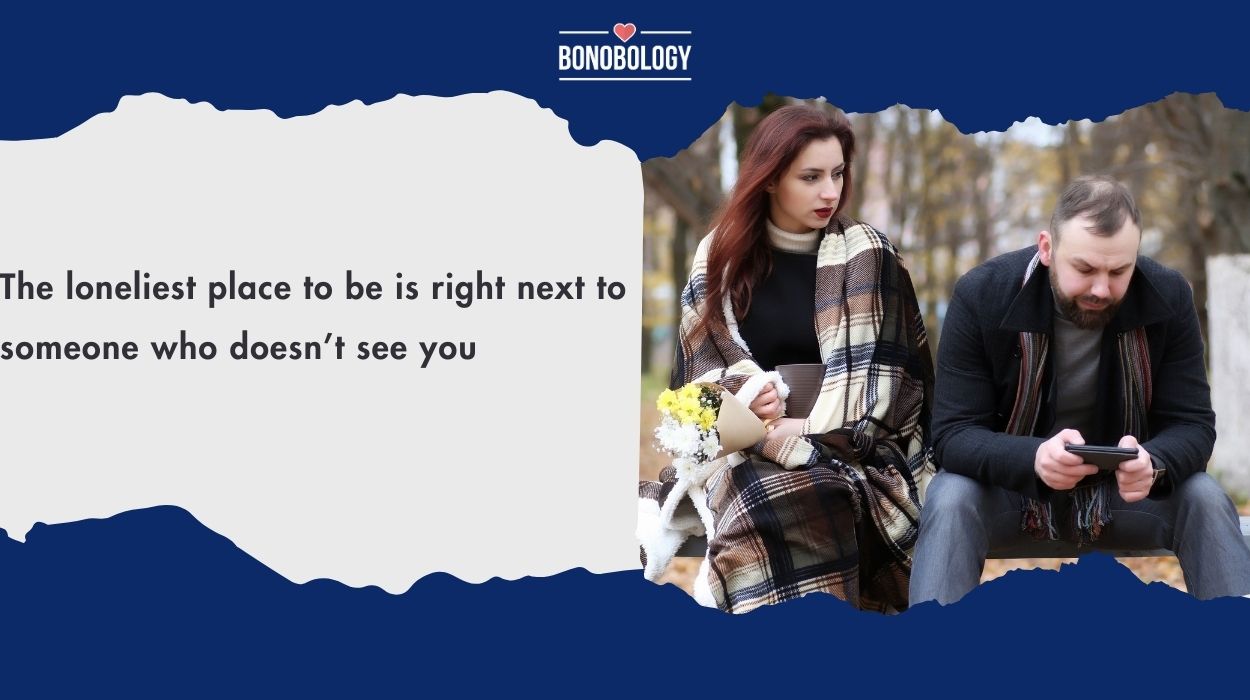Any long-term relationship goes through its fair share of ups and downs, where intimacy and connection ebb and flow. As long as the sense of distance and being alone is a passing phase and you and your partner can find your way to each other, it’s not a cause of concern. However, when you start feeling alone in a relationship consistently, it can be a sign of trouble.
After all, a relationship is about a shared journey of love and companionship. When despite caring deeply for your partner, you feel disconnected and distant from them, it can bring up a lot of discontentment and unhappiness. Given that this distance and feeling of loneliness can creep in quietly and gradually, the shift in your relationship dynamics can be all too confusing.
Why don’t you talk as much anymore? Why doesn’t your partner seem to care? Why does it feel like there is a part of them you just can’t seem to access? To find the answers, you first need to acknowledge the problem and then look for a way to address it. To that end, let’s take a look at some of the most common signs that you are alone in a relationship, along with some expert-backed solutions to deal with them.
21 Signs That You Are Alone In A Relationship
Feeling lonely in a relationship can mean different things to different people, depending on the individual need for connection and intimacy. Besides, emotional loneliness can manifest in such subtle ways that you can feel it as an undercurrent running through your relationship but without being able to put a finger on what exactly is amiss. As I said before, it can all be deeply unsettling and confusing. To make sense of this disconcerting shift, you need to be able to spot the warning signs that you are alone in a relationship. These include:
1. Your partner doesn’t seem interested in your day

A partner’s lack of interest in the goings on in your life is one of the most telling signs of disconnection in a relationship, which can bring up feelings of isolation and loneliness. Say you find out that you’re up for a big promotion at work and excitedly text your partner but they don’t even bother to reply because “they were too busy”. Or you tell them about how you had an ugly showdown with a coworker and they barely look up from their phone.
These behaviors suggest that your partner is mentally or emotionally withdrawn from your life. Their lack of investment and interest can naturally leave you feeling lonely in a relationship. Psychologist Dr. Carla Marie Manly says, “When a partner disengages from your day-to-day experiences, it can create a serious emotional divide.”
2. Your conversations are surface-level
Meaningful conversations pave the way for a deeper connection. No matter how long you’ve been together, you need to keep getting to know each other more intimately to nurture your connection. If those meaningful conversations that stimulate emotional intimacy have exited your relationship and your interactions revolve around groceries, bills, logistics, and routines, you may find yourself struggling with the thought, “I feel so alone all the time.” Explaining why people experience emotional isolation in relationships, Relationship coach Esther Perel notes, “When couples stop sharing their dreams, fears, and feelings, they can feel worlds apart even in the same room.”
3. You make most of the effort
Yet another one of the telling signs that you are alone in a relationship is that the burden of keeping the relationship afloat falls squarely on you. You’re the one initiating contact, planning date nights, initiating intimacy, planning vacations or surprises. And your partner is just along for the ride. It can start to feel like you’re in a one-sided relationship. Renowned psychologist and relationship expert Dr. John Gottman says, “A one-sided effort creates an imbalance in power dynamics and leaves the other person feeling alone and unimportant.”
4. Physical intimacy dwindles
Acts of physical intimacy such as hugging, kissing, holding hands, or cuddling are crucial for reinforcing the emotional connection between a couple. You may start feeling alone in a relationship if your partner stops being physically affectionate toward you. Intimacy counselor Dr. Laura Berman says, “Physical closeness often mirrors emotional closeness, and a lack can signal deeper issues.”
5. You don’t feel heard

Therapist Nedra Glover Tawwab says, “Being heard validates us. When our words seem invisible, so do we.” If every time you share something important with your partner—be it your concerns about the relationship or something you’re struggling with on the personal front—they make it about themselves or start talking about their own struggles and challenges, instead of hearing you out and validating your feelings, you may begin to feel like your voice and thoughts are not valued. When this emotional invalidation repeats on a loop, you may feel less and less inclined to open up to your partner. The result? Emotional loneliness.
6. Your partner seems distant or distracted
If your partner is always too preoccupied to truly engage and connect with you, it signals a lack of prioritization. Every time you try to talk to them and they’re immersed in their phone or nod absent-mindedly, it creates a barrier between you two. Over time, these barriers stack up and manifest as emotional absence. When your partner is not there for you emotionally, you’d naturally find yourself lamenting, “I feel alone in my relationship.”
7. They prioritize everything else over you
Feelings of loneliness can also begin to fester when you spot signs you are not valued in a relationship. If your partner’s schedule is always packed with work, hobbies, and social commitments, leaving little quality time for you as a couple, you may start feeling undervalued and a sense of disconnection can creep in. Dr. Gary Chapman, author of The 5 Love Languages, explains, “When someone chooses everything else over you, it’s a sign their commitment may be elsewhere.”
8. Your partner makes no effort to resolve conflicts
Disagreements are par for the course of a relationship. It’s a couple’s ability to resolve conflict healthily that reflects the strength of their bond. In fact, healthy conflict resolution can help bring partners closer by weeding out differences and fostering moments of vulnerability.
If your partner refuses to partake in this essential part of keeping the relationship alive and healthy by shutting down in the face of conflict or ignoring issues, you may feel as if the onus of carrying the emotional weight of unresolved issues is on you alone. This can bring in resentment and distance in a relationship.
9. They don’t celebrate your wins
If your partner downplays, refuses to acknowledge, or downright dismisses every accomplishment or stride you make in your personal or professional life, you will invariably find yourself thinking, “I’m not happy in my relationship.” After all, you and your partner are supposed to be each other’s biggest cheerleaders. If they don’t step up and embrace that role, you may feel alone and isolated irrespective of all your achievements and accomplishments.
“Successful couples make a point to celebrate each other’s successes. A lack of support can feel deeply isolating.”
—Dr. John Gottman, psychologist
10. You feel emotionally unsupported
Reena, a 32-year-old mother of a newborn, feels that her husband has been unsupportive during pregnancy and after childbirth. This has left her grappling with feelings of loneliness and isolation. “Our newborn refuses to sleep through the night. She just wails unless I nurse her. Instead of helping me comfort her, my husband just gets annoyed that I can’t get the baby to sleep and insists that I nurse her through the night just so that she won’t cry.
“It’s been so physically and emotionally. I feel so alone and overwhelmed. I don’t know whom to turn to for help and support.” If you’ve been experiencing a similar lack of emotional support from your partner, you might end up feeling like you’re facing everything alone. That can be a strong trigger for feeling lonely in a relationship.
11. They dismiss your feelings
Marriage counselor Dr. Jane Greer states, “Dismissal is a sign that a partner doesn’t value your experience, which is a form of emotional abandonment.” This can hamper vulnerability in the relationship, and cause you to withdraw emotionally, which only further widens the distance between you and your partner.
Sadie, a law student who has lived this firsthand, says, “I struggled with feelings of loneliness when my partner moved to a different city and we decided to give LDR a shot. Every time I’d share how much I was struggling to cope with this absence, he’d shut me down saying things like, “Stop being so sensitive” or “Oh, not this again. Why can’t we just have a nice conversation without you whining all the time?” His insensitivity ultimately led me to end things with him.”
12. Your partner doesn’t plan a future with you

How your partner responds to conversations about the future may impact how secure and connected you feel in the relationship. If they don’t include you in their play or seem uncomfortable discussing long-term plans involving you both, it suggests that they may not see the relationship going the long haul.
This can leave you feeling insecure and uncertain about your place in their life. When you don’t know where you stand with your partner or if you’re on the same page about what the future might hold for you, struggling with a sense of disconnection and distance is only natural.
13. You feel like you’re walking on eggshells
Why do I feel so alone in my relationship, you wonder? One plausible explanation could be that you find yourself steering clear of certain topics to keep the peace, fearing that if you bring them up your partner will become more distant and withdrawn.
When you constantly censor yourself and feel like you’re having to walk on eggshells to avoid upsetting them, it creates an underlying anxiety that stifles authenticity. The loneliness you feel may be the outcome of you withholding parts of yourself with your partner. Clinical psychologist Dr. Lisa Firestone explains, “Walking on eggshells creates a constant state of anxiety, eroding closeness.”
14. You’re more friends than partners
While friendship between partners can fortify the foundation of a relationship, when that’s all there’s left between them, feelings of loneliness can begin to take root. A complete lack of romantic or emotional intimacy is one of the first signs of disconnection in a relationship. It can make the relationship feel hollow and incomplete, making you feel more and more isolated and alone despite having a partner to share your life with.
15. You spend most of your free time alone
Another one of the significant signs that you are alone in a relationship is that even when you’re physically together, you prefer doing separate things to spending time with each other. At home, you’re often in separate rooms or doing different things. Or even when you’re together in your room, you’re both busy on your phone instead of using it as an opportunity to connect.
This indicates a lack of desire to be close. Eventually, the physical and emotional distance can fuel the feelings of loneliness. Psychotherapist Dr. Jenn Mann says, “Quality time is essential to nurture a relationship. Physical proximity without connection still leaves you feeling alone.”
16. Your partner avoids meaningful eye contact
Emotional isolation in relationships is also reflected in partners’ body language and behavior around each other. For instance, if your partner avoids making meaningful eye contact with you during conversations or in your intimate moments, it can create a subtle but palpable divide that makes you feel unseen, and therefore, alone in your relationship. Body language expert Patti Wood explains, “Eye contact is a window to intimacy. Its absence can signal emotional distance.”
17. You feel like a burden when you need them

An absence of mutual support is another telling sign that you’re alone despite being in a relationship. If you feel guilty or burdensome about asking for help when you’re sick or in need of emotional support because your partner acts as if stepping up for you is a great inconvenience to them, your relationship lacks empathy and care. As a result, you may find yourself thinking, “I feel alone in my relationship.”
18. They seem less interested in your interests
A lack of interest in one’s partner’s likes and dislikes is among the undeniable signs of disconnection in a relationship. If your partner has gone from suggesting activities and hobbies you could pursue together to showing no interest in shared interests, it creates a sense of separateness. That, in turn, can leave you feeling alone in a relationship.
19. You feel drained instead of energized
If the idea of spending time with your partner leaves you feeling drained rather than happy and excited, it indicates that your emotional connection has depleted. In such situations, the relationship can begin to feel like a burden rather than a source of support. This can quickly snowball into bitterness, resentment, and incessant conflict, which exacerbate feelings of loneliness and disconnection.
“Relationships should ideally rejuvenate us. Consistent depletion indicates an imbalance.”
—Dr. Sara Kuburic, “The Millennial Therapist”
20. Your needs and boundaries aren’t respected
If you set boundaries but your partner repeatedly ignores them, it can leave you feeling like your autonomy and well-being are threatened. This can not only make you feel as if your partner doesn’t respect your needs but also make the relationship an unsafe space, making it harder for you to connect with them. This chasm keeps getting wider with every infraction, resulting in disconnection and loneliness.
21. You miss the ‘old’ version of your relationship
Dr. Alexandra Solomon, author of Loving Bravely, says, “When we long for the past, it often reflects unmet needs in the present.” If you’re staying in the relationship simply because of how wonderful, loved, and cherished your partner made you feel at one point and keep hoping against hope that those days when you were so in sync and in love with one another will come back if you just try a little harder, hold on a little longer, your emotional needs are not being met. That void is what’s making you feel lonely and alone.
7 Tips To Deal With Feeling Alone In A Relationship
Feeling alone in a relationship, withdrawn and isolated despite having a partner to share your life with, can be emotionally grueling to say the least. It fills you up with uncertainty and insecurity, making you wonder if your relationship is headed toward an inevitable doom. Well, if you don’t pay attention to the signs of growing disconnection and identify and address the underlying cause, it might just.
However, the opposite is just as true. There is no reason why you cannot find a way to reconnect and rekindle the connection as long as both you and your partner are willing to work through the issues and make constructive changes in the way you engage with each other. And how do you do that? Here are 7 expert-backed tips on dealing with feeling alone in a relationship:
1. Open up to your partner about your feelings
What to do when you feel alone in your relationship, you wonder? First and foremost, don’t bottle up your feelings and let them fester. Instead, have an honest conversation with your partner about how you feel. To make sure they don’t dismiss or invalidate your concerns, share specific examples of times you’ve felt lonely or disconnected, and let them know you want to work toward improving your relationship. It’s vital that you remain calm and avoid placing blame or hurling accusations.
Psychologist Dr. Carla Marie Manly recommends expressing feelings from a place of vulnerability rather than blame. “Opening up from a place of personal feeling invites empathy and connection rather than defensiveness,” she adds.
2. Identify and communicate your needs clearly

Signs of disconnection in a relationship when either one or both partners’ needs are not being met. It’s entirely possible that your partner isn’t emotionally withdrawn or distant or uninvested, but they simply haven’t been able to understand your needs, desires, and expectations.
So, before initiating a dialogue with your partner, take some time to introspect and ask yourself, “Why do I feel so alone in my relationship?” Identify what specific actions would make you feel more connected. Whether it’s spending quality time, receiving more emotional support, or regular check-ins, be specific with what you need.
Dr. Gary Chapman, author of The 5 Love Languages, emphasizes that it’s critical to understand your own needs before expecting them from your partner. “Learning to communicate your love language—whether that’s words of affirmation, acts of service, or quality time—helps your partner know how to show up for you,” he says.
3. Seek balance in effort and responsibility
The feeling of loneliness can also stem from a lack of effort, accountability, and consistency in a relationship. If you feel as if your partner doesn’t step up and do their bit in nurturing your connection, it can start to feel as if you’re in a one-sided relationship. That can be deeply dissatisfying. The only way to address it is to stop taking on all the emotional labor, fearing that if you don’t go the extra mile your relationship will fall apart, and talk to your partner about ways to share responsibilities.
Also, don’t make it contingent that they contribute to the relationship in a way that you see fit. Instead, give them the space and freedom to put in the effort that comes to them naturally. When they do something nice and thoughtful for you, appreciate it. This fosters an atmosphere where you both feel motivated to put effort into the relationship.

4. Reconnect through shared activities
Dr. Sue Johnson, developer of Emotionally Focused Therapy, emphasizes, “Doing enjoyable activities together rekindles the bond and reminds both partners of what they love about each other, helping to bridge emotional gaps.” If you’re struggling with distance and disconnection, let shared hobbies, interests, and activities be the bridge that helps you find your way back to each other. Be it listening to music on long drives, going on hikes, playing tennis, attending a wine-tasting event, or taking on a home improvement project, share experiences that renew your sense of partnership and allow you to create new, positive memories together.
5. Work on self-fulfillment
If you often find yourself lamenting, “I feel alone in my relationship,” it could also be because you have made your relationship the sole focus of your life while your partner still leads a fairly well-rounded life. If they have their friends, social commitments, and hobbies to bring them a sense of fulfillment whereas you’ve reduced your existence to your work and love life, it’s only natural that you will feel alone when your partner is out there, doing their own thing.
Interestingly, the solution is simple—instead of fixating on what to do when you feel alone, focus on building a fulfilling life and balance independence with a romantic partnership. Engage in personal hobbies, connect with friends, or pursue individual goals. When you’re fulfilled as an individual, your perspective toward yourself changes and you begin to rely less and less on others for validation.
“Building self-compassion helps us meet our own emotional needs, so we’re not solely dependent on others for our sense of fulfillment.”
—Dr. Kristin Neff, psychologist
6. Practice active listening and empathy
While you’re struggling with the unsettling sense of loneliness in your relationship, your partner may be feeling it too. When you open up to them about how you’ve been feeling, don’t dismiss any concerns or feelings that your partner shares. Or think that your partner is trying to shirk accountability by turning things around and making it about them.
Instead, show genuine interest in their feelings and experiences, and practice active listening to understand their perspective better. Dr. Harville Hendrix, author of Getting the Love You Want, says, “Active listening fosters empathy and encourages both partners to open up. This mutual exchange can help reconnect partners who feel emotionally distant.”
7. Consider couples counseling
If you’ve tried various approaches and the signs that you are alone in a relationship still stare you in the face, it may be worthwhile considering seeking professional help. Talk to your partner about going into couples therapy. It can provide a safe, guided space for both of you to communicate openly and reconnect with each other. If you’re considering getting help but don’t know where to look, skilled and experienced mental health professionals on Bonobology’s panel are here for you.
Key Pointers
- Feeling alone despite being in a relationship is deeply emotionally distressing
- Some of the common signs that you are alone in a relationship include your partner’s lack of interest in your life as well as lack of intimacy, quality time, and deep conversations
- If it feels like you and your partner co-exist without sharing your lives in a meaningful way, feelings of loneliness can begin to seep in
- To deal with this sense of loneliness, it’s important to embrace vulnerability, tell your partner how you feel as well and actively listen to their perspective
- Working toward self-fulfillment and gaining clarity on your needs can also help
- If despite your best efforts, you haven’t been able to make headway in resolving the feeling of loneliness and disconnection, consider couples therapy
Final Thoughts
The signs that you are alone in a relationship while distressing, can also present an opportunity for you to work on improving your connection to your significant other. So, don’t let it become a source of self-pity and wallow in misery but look for ways to bridge emotional gaps and foster deeper understanding. Remember that feeling connected requires mutual effort, open communication, and a willingness to address underlying needs. As long as you and your partner are willing to work through your issues, there is no reason why you can’t get over this rough patch and find a way to reconnect.
Your contribution does not constitute a charitable donation. It will allow Bonobology to continue bringing you new and up-to-date information in our pursuit of helping anyone in the world to learn how to do anything.





